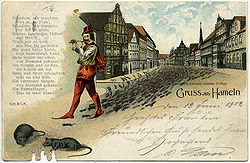When I first started this blog, way back in April 2013, its original purpose was as a poetry blog for National Poetry Writing Month. Its content has varied quite a lot in the intervening years, but every now and again it feels appropriate to bring it back to its roots. And today is one such occasion.
Fans of the English poet Robert Browning may recognise the blog's title as a nod to his nostalgic poem Home Thoughts From Abroad, but he is perhaps best known for his long narrative poem The Pied Piper of Hamelin. This cautionary tale about the consequences of betrayal is said to be based on real events, which (according to Browning) allegedly took place "on the twenty-second of July thirteen hundred and seventy-six" in a small town in what is now northern Germany.

Postcard "Gruss aus Hameln", featuring the Pied Piper of Hamelin, 1902
Much has been written about the Pied Piper story elsewhere, and I'm not going to repeat it all here, but I've included some links at the end of this post for anyone who'd like to find out more. Instead, I'm offering you my own light-hearted tribute to this enduring classic.
THE PIED PIPER OF LIMERICK
A town in a faraway nation
had a terrible rat infestation,
about which the mayor
appeared not to care,
to the townspeople's rage and frustration.
The plague had become so acute
that the townsfolk were quite resolute:
"We must do something here!"
Then who should appear
but a man in a weird coloured suit.
"I see you've a problem," said he.
"Now listen: if I guarantee
to dispose of your rats,
give me one thousand crowns. That's
my fee." Said the mayor, "I agree."
The stranger, with fingers a-quiver,
piped a tune which made all people shiver.
But the hypnotic air
made the rats leave their lair
and leap to their deaths in the river.
Oh, great was the joy in the town!
Then the piper said "My thousand crowns?"
When the mayor, looking shifty,
just offered him fifty,
the piper's smile turned to a frown.
He glared, strode out into the square,
and, raising his pipe in the air,
played another refrain.
The town's children came
and followed him - heaven knows where.
The mayor's desperate pleas were in vain,
for the children were ne'er seen again.
So the lesson inferred
is "You must keep your word"
and to think otherwise is insane!
The full text of Browning's poem, together with a detailed analysis, can be found here. There is also a very informative article on Wikipedia.
An excellent stop-motion animation performance of the poem can be seen here.

Excellent! I remember when I worked in childcare, we used to mutter that certain parents made us feel like doing the same. :)
ReplyDeleteI can read that on many multi-levels! Cautionary, indeed.
ReplyDelete